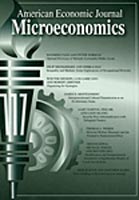We characterize the optimal tariff bindings and the escape clause in a trade agreement among asymmetric countries that are subject to idiosyncratic political-economy shocks. We assume that shocks are private information, and that escape clauses allow the use of a costly monitoring technology to reveal the true value of the private information. We define a concept of convergence of tariff preferences, and show that bindings are higher for countries whose preferences are less convergent and for countries with a lower degree of market power. We also show how the introduction of contingent protection will substitute for tariff overhang, and establish that a sufficient condition for contingent protection to eliminate the use of tariff overhang is that tariff preferences be globally convergent.
Cap and Escape in Trade Agreements
Cap and Escape in Trade Agreements
- Mostafa Beshkar, Eric W. Bond
- Publication Date
2017 - Website
- Read the article
 The College of Arts
The College of Arts